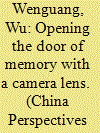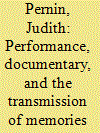| Srl | Item |
| 1 |
ID:
136292


|
|
|
|
|
| Summary/Abstract |
For a revolution over “culture,” remarkably little has been said about the Cultural Revolution culture itself, and even less about the apolitical, private art produced underground. This article explores this apolitical, private art, arguing that it was a “rebellion of the heart” against the state’s ruthless destruction of the private sphere. Mao’s Party-state drastically fragmented families, moulding socialist subjects through “revolution deep down into the soul.” Paintings of (broken) homes and interiors, flowers, and moonlight articulate lived experiences of the revolution while silently reinventing a private refuge for the body and soul to subsist beyond state control. Defying orthodox revolutionary mass culture, this apolitical art articulated private experience and created a private inner world for a new form of modern subjectivity, while generating community and human solidarity against relentless class struggle and alienation.
|
|
|
|
|
|
|
|
|
|
|
|
|
|
|
|
| 2 |
ID:
136290


|
|
|
|
|
| Summary/Abstract |
Independent documentary film projects dealing with history have recently multiplied in China. While all seek to shed new light on personal experiences of the Mao era, they vary greatly in form, method, and scale. Launched in 2010 by Wu Wenguang at the Caochangdi Workstation, a space devoted to contemporary dance and documentary film, the Folk Memory Project aims at producing various textual and visual records of the historical experience of rural populations, especially during the Great Leap famine. Of special interest are the 20 documentaries of the Folk Memory Project’s film section – a body of works constantly growing following yearly returns by filmmakers to their “home” villages. These films are characterised by a performative aspect that is rare in other Chinese documentaries on similar topics. This contribution examines this body of documentaries and the role of performance and performativity in the recording of collective memory of the famine.
|
|
|
|
|
|
|
|
|
|
|
|
|
|
|
|